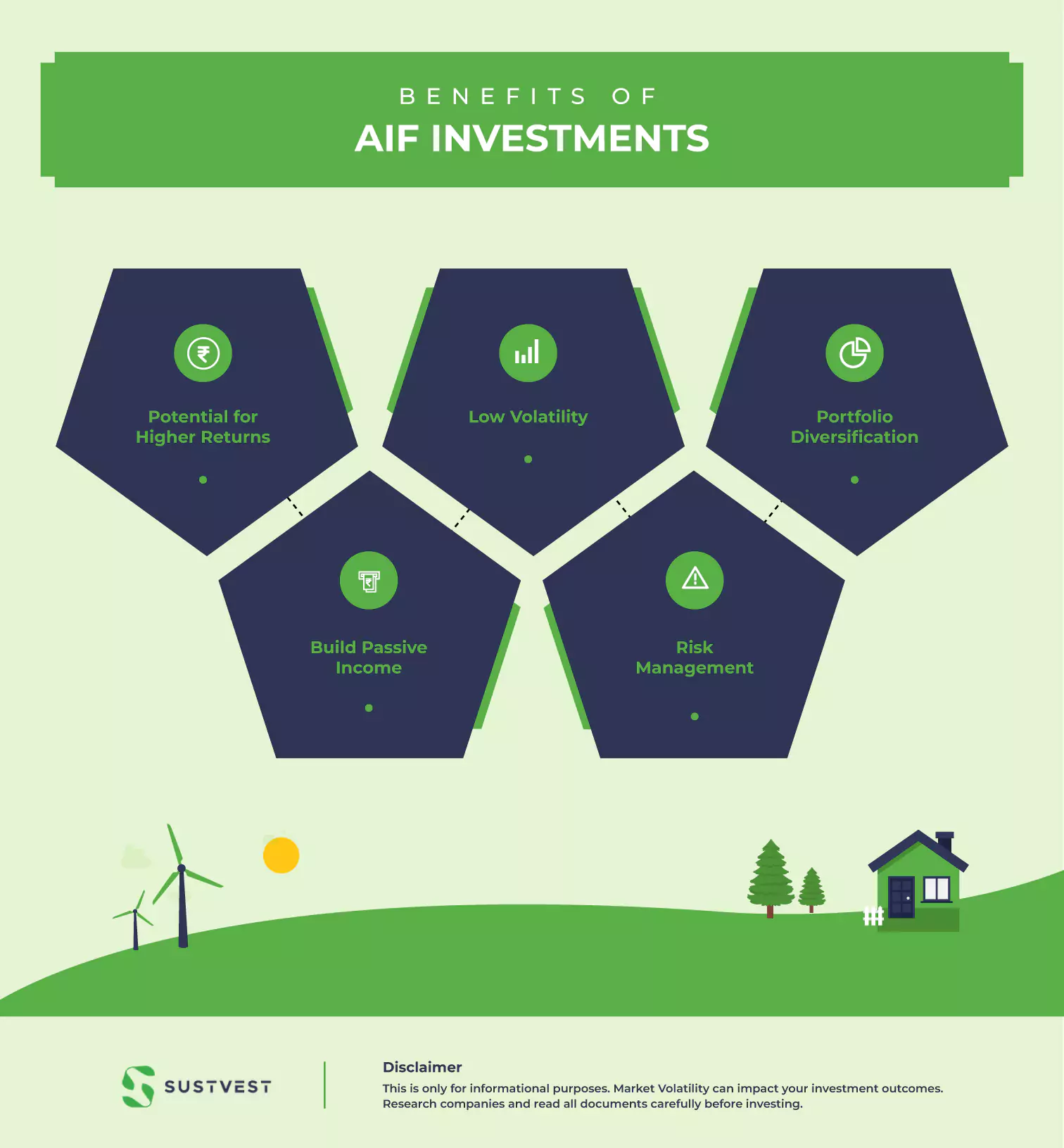Investing in cash, bonds, stocks, and gold are traditional ways where people require big investments and get lower returns. That’s why people are now looking for various alternative investment funds in India to boost their revenue streams and get higher returns.
Alternative Investment Funds (AIFs) are considered great investment options that you can consider. If you’re looking for the best alternative investment funds in India for higher returns compared to traditional investments, then you’re at the right place.
At SustVest, we will guide you to invest in better options with higher returns.
In this article, we will discuss how to invest in alternative investment funds in India to boost your revenue stream for long-term profitability.
So let’s dive in!

What Is An Alternative Investment Fund?
Alternative Investment Funds (AIFs) are different from traditional investment options. AIF is a privately pooled investment option with a collection of assets for investment, such as renewable energy, mining, real estate, private equity, venture capital, infrastructure, hedge funds, angel fund, and many non-conventional assets.
Compared to mutual funds or any traditional investments, AIF is the fastest-growing option for getting higher returns with lower risks due to the diversification of asset investment. However, AIF doesn’t come under the purview of SEBI’s mutual fund regulations.
Investing in Alternative Investment funds in India requires good capital and risk-taking capacity, but if you invest carefully in the right assets and diversify your portfolio, then you can reduce the risks and get higher returns to build another stream of revenues.
For more details on AIFs, check out our blog on Are AIF Investors Taxed in India here.
Different Types Of Alternative Investment Funds In India
According to the Securities and Exchange Board of India, there are different types of Alternative Investment Funds in India. They can be divided into three categories:
1. Category-1 AIFs
Category 1 AIFs include investment in infrastructure funds, SMEs, venture capital funds, angel funds, and social venture capital funds. The Government supports & promotes these Investments as the economy grows and other opportunities are created. These are some assets that come under Category 1 AIF:
- Infrastructure Funds
- Venture Capital Funds
- SME (Small and Medium Enterprises) Funds
- Angel Funds
Let’s describe these options in detail!
1. Infrastructure Funds
Infrastructure is one of the primary investment options you must consider. The infrastructure assets include natural resources such as renewable energy (solar, hydro, thermal, and wind) energy sector, where the growth is growing rapidly, and you can get higher returns. Currently, the government is offering various incentives & tax rebates on renewable energy, making it a better option for investors for high profitability. So natural resources are one of the best AIF category 1 investment options for higher returns.
2. Venture Capital Funds
Venture Capital Fund (VCF) in Startups can also produce high returns but comes with risks. It’s the initial stage investment of any Startup that requires funding for growing and expanding their business. In AIF Category-1 investment, the VCFs pool invests in multiple Startups based on their size, phase of development, and required funds and investing with the right proportion for higher returns.
3. SME Funds
SME Funds invest in small & medium enterprises that help those publicly listed startups and other companies that require funding to grow and get higher returns (more than 8% yearly) for investors. It’s one of the good investment options with the risk that helps company, business, economy, and self-portfolio growth.
4. Angel Funds
Angel Funds come from angel investors that invest in initial startups and early-stage companies that require funding to grow and later get higher returns and profitability when the company grows. Angel Funds are regulated by the Securities and Exchange Board of India (SEBI) and have some restrictions & guidelines for investment.
2. Category-2 AIFs
Category 2 AIF does not come under Category 1 and 3 because these companies do not take debt for purposes other than daily operational activities. Some of the following Investment options in category-2 AIF:
- Debt Funds
- Private Equity Funds
- Fund of Funds
Let’s discuss this in detail!
1. Debt of Funds
These funds invest in debt securities of unlisted companies that have the potential to grow. They invest in debt securities such as bonds, debentures, and other fixed-income securities so that investors get consistent passive income through their investments with capital appreciation.
2. Private Equity Funds
These funds invest in established private companies to acquire their ownership stakes, providing high returns to investors compared to traditional investments.
3. Funds of Funds (FoFs)
These funds invest directly in other alternative investment funds rather than investing in a business or asset. It gives investors a diversified portfolio with different assets to invest in and get higher returns with low risks.
3. Category-3 AIFs
Category-3 AIF comes with short-term investments and complex trading strategies and invests in structured products with high-risk strategies to generate higher returns for investors. Here are some of the category 3-AIF Investment options:
- Hedge Funds
- Private Investment in Public Equity Fund (PIPE)
Let’s discuss this in detail!
1. Hedge Funds
Hedge Funds are investing in equity markets that come with high risk. However, such high-risk strategies can give investors higher returns. Mostly high net worth investors prefer to fo hedge funding to capitalize on their wealth and get higher returns.
2. Private Investment in Public Equity Fund (PIPE)
PIPE funds are invested in equity shares of publicly listed companies in India that require capital growth or expansion. Mostly invested from mid-to-large size companies, and their various streams of revenues come with PIPE funds.
Check out our blog on What Are the Different Investment Alternatives Available to an Investor here.
Benefits Of AIF Investments
Alternative Investment Funds in India are seeing a lot of traction. Here are some major benefits of AIF investments:
1. Potential for Higher Returns
One of the biggest benefits of investing in AIF is getting higher returns on investments compared to traditional investments in India. One of the best AIF investments with stability and long-term profitability is natural resources, such as investing in solar, wind, or hydroelectricity plants to get higher returns and capitalization.
2. Low Volatility
Investing in Alternative Investment Funds (AIFs) is a great option for protecting investors from volatility and having a stable portfolio. In such market fluctuations, keeping the volatility low and getting stable income is important.
3. Portfolio Diversification
Investing in AIF helps you build a diversified portfolio of your investments, lower the risks, increase profitability, and achieve stable revenue streams.
4. Build Passive Income
Investing in AIF allows you to build Passive Income streams from assets such as real estate or private equity. It’s one of the attractive options for investors to invest in AIF.
5. Risk Management
AIF Investing can mitigate the risks and ensure safe investments in different assets to get higher returns and low volatility. With a diversified portfolio and alternative investment strategies, investors can get a stable income stream with long-term profitability.

How To Invest In Alternative Investment Funds in India? – Fulfill The Following Criteria
Investors who are planning to invest in Alternative Investment Funds in India must fulfill the following criteria:
- The minimum amount required for investment is Rs.1 crore. On the other hand, directors, employees, and fund managers can start with Rs.25 lakh.
- These funds have a lock-in period of a minimum of 3 years.
- AIFs are restricted to only 1,000 investors in each investment, but angel funds have 49 specific investors only.
- Investors of AIF can be Indian or Non-resident Indians.
FAQs: Alternative Investment Funds in India
What is the maximum number of investors allowed in Alternative Investment Funds in India?
The AIF Regulations cap for the maximum number of investors allowed for an AIF is 1,000.
Which are the Category-3 Alternative Investment Funds in India?
Various types of funds like hedge funds, PIPE Funds, etc. are registered as Category III AIFs in India.
Conclusion
Alternative Investment Funds (AIFs) are a great investment option to get higher returns with risks. We hope this article helps you to know how to invest in alternative investment funds in India to get higher returns. So If you plan to invest in AIF to get higher returns, investing in renewable energy (such as wind, solar & thermal energy) is a great option. However, investing in AIF can be a challenging task and requires various parameters and market research before investing that overall requires expert guidance.
With SustVest, you can start your AIF investment journey with expert guidance by investing in solar plants and infra EVs, diversifying your portfolio, and building passive income with higher returns and long-term profitability.

Founder of Sustvest
Hardik completed his B.Tech from BITS Pilani. Keeping the current global scenario, the growth of renewable energy in mind, and people looking for investment opportunities in mind he founded SustVest ( formerly, Solar Grid X ) in 2018. This venture led him to achieve the ‘Emerging Fintech Talent of the Year in MENA region ‘ in October 2019.




